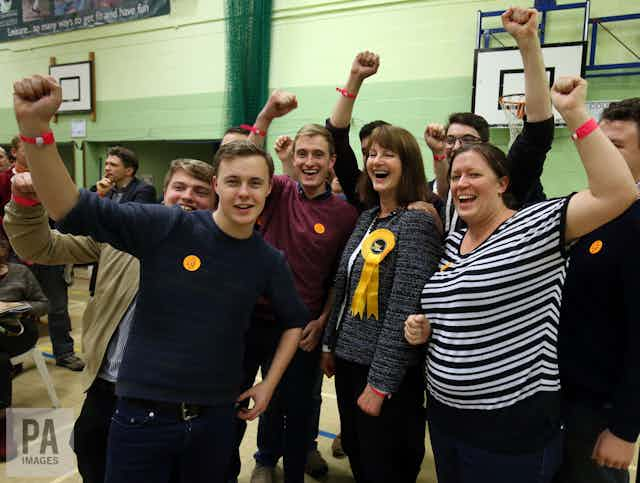For those who like to read the runes of politics, parliamentary by-elections are a gift. Each local area of course has its own characteristics but these contests offer a snapshot verdict on the government and major parties between general elections. It’s also a chance for those parties to try out and refine campaigning techniques.
The Witney by-election, caused by the resignation of former prime minister David Cameron, has certainly given us something to pore over.
By all accounts this is one of the safest Tory seats in the country – Cameron took 60% of the vote in the 2015 election. West Oxfordshire Council is Tory run and, although there are pockets of relative deprivation, the constituency is generally rural and affluent.

And indeed, the Conservative candidate won the by election on October 21. But the significance in Witney lies less in which party won than in the performance of the parties that didn’t.

After being almost totally wiped out in the 2015 election, the one-time coalition partners increased their vote share by 23% in Witney, beating Labour to come in second place behind the Conservatives. There was a swing to the Lib Dems of just over 19%, denting the Conservative majority by around 20,000 votes.
The Lib Dems have a reputation as a formidable by-election fighting team. Actually this reputation is based on events quite some time ago. Since 2007 the party has performed relatively poorly with tiny increases and some falls in percentage vote share. Even Eastleigh, which the party held in 2013 after Chris Huhne’s resignation, saw a large drop in vote share.
So party organisers will be extremely satisfied with this result. It indicates that the Lib Dem campaign machine is working again. Considerable effort went into encouraging activists to making phone calls to voters – or making the journey to Witney – and at times it was hard to walk down a street without seeing a Lib Dem campaigner. Labour was less obvious on the ground, although the party had clearly worked in its areas of strength, as demonstrated by the number of posters in some pockets of support.
It also shows that there are Conservative supporters who will swap to the Lib Dems. That may indicate that they are unhappy with the whole Brexit saga (Witney voted to remain) or with new prime minister, Theresa May.
2015 election results in Witney

For Labour, I am sure the party forums will carry arguments about Corbyn’s failure to deliver a challenge to the government here. Witney is not a seat Labour could conceive of winning, but there must be some anxiety at a failure to make progress. The Labour candidate was, after all, a local councillor with a core of support.
As for UKIP, it will not be happy to have been beaten into fifth position below the Greens. We’ll never know how much the fight between two of its MEPs and the ongoing saga around the leadership has affected this vote. But common sense tells us that the party is facing not just a series of rows but a crisis of identity. It is impossible to do well in this kind of battle without a clear sense of purpose and message.
The Liberal Democrats clearly approached this race with a clear purpose and have achieved it. A full recovery is still a long way off but the Witney result has brought some much-needed cheer.

